Property Law: Analysis of Ownership, Inheritance, and Legal Rights
VerifiedAdded on 2020/10/04
|8
|2071
|35
Report
AI Summary
This report delves into the complexities of property law, examining the legal definitions of ownership and the rights associated with it. The report analyzes a scenario involving joint ownership, inheritance, and the implications of wills. It references key legal acts, such as the Law of Property Act 1925, and explores the concepts of joint ownership, property transfer, and the rights of individuals in various scenarios. The report also addresses the rights of individuals who invest in a property without being the owner, emphasizing the importance of legal contracts and compensation. Furthermore, the report provides case studies to illustrate the practical application of property law principles, providing a comprehensive overview of property ownership and inheritance regulations.
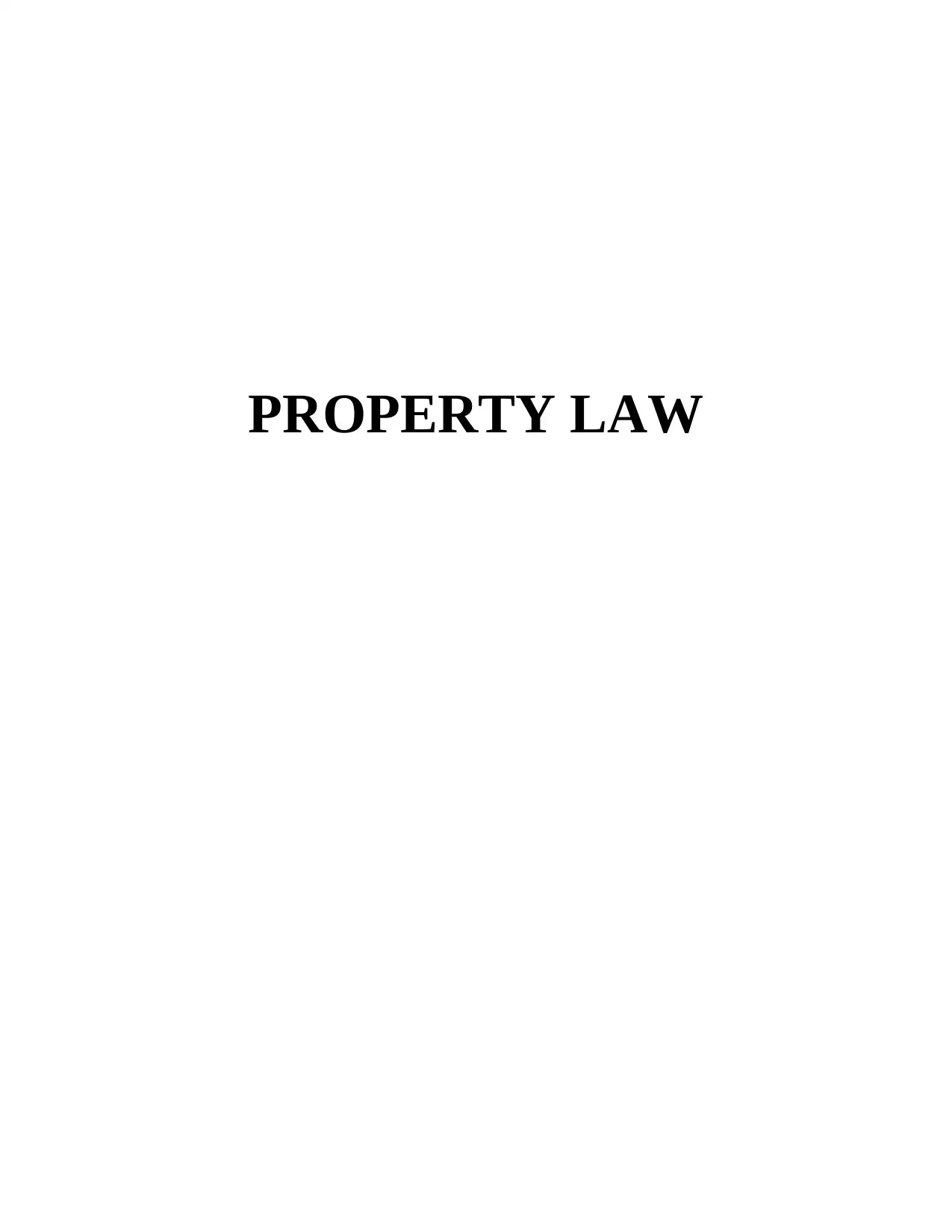
PROPERTY LAW
Paraphrase This Document
Need a fresh take? Get an instant paraphrase of this document with our AI Paraphraser
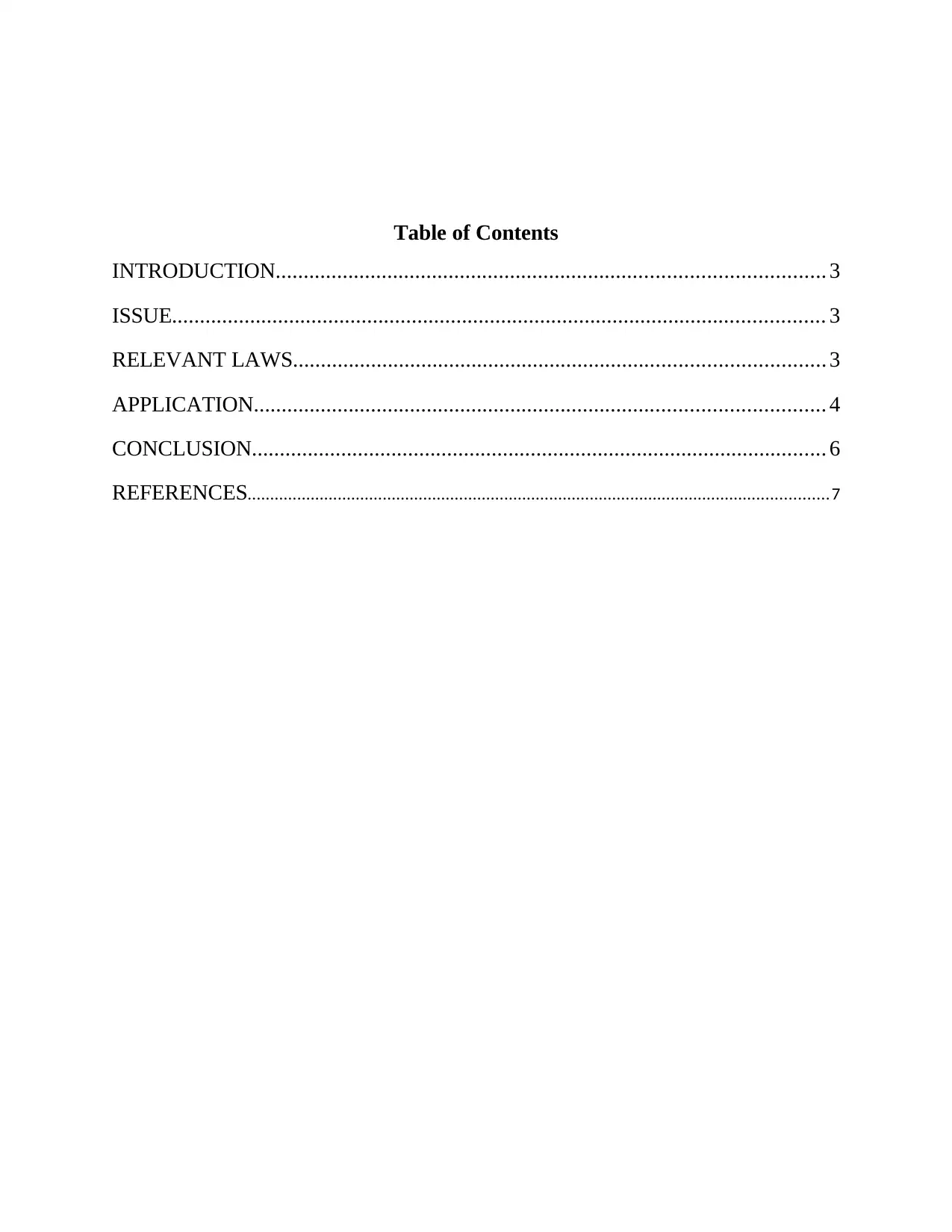
Table of Contents
INTRODUCTION.................................................................................................. 3
ISSUE..................................................................................................................... 3
RELEVANT LAWS............................................................................................... 3
APPLICATION...................................................................................................... 4
CONCLUSION....................................................................................................... 6
REFERENCES.................................................................................................................................7
INTRODUCTION.................................................................................................. 3
ISSUE..................................................................................................................... 3
RELEVANT LAWS............................................................................................... 3
APPLICATION...................................................................................................... 4
CONCLUSION....................................................................................................... 6
REFERENCES.................................................................................................................................7

⊘ This is a preview!⊘
Do you want full access?
Subscribe today to unlock all pages.

Trusted by 1+ million students worldwide
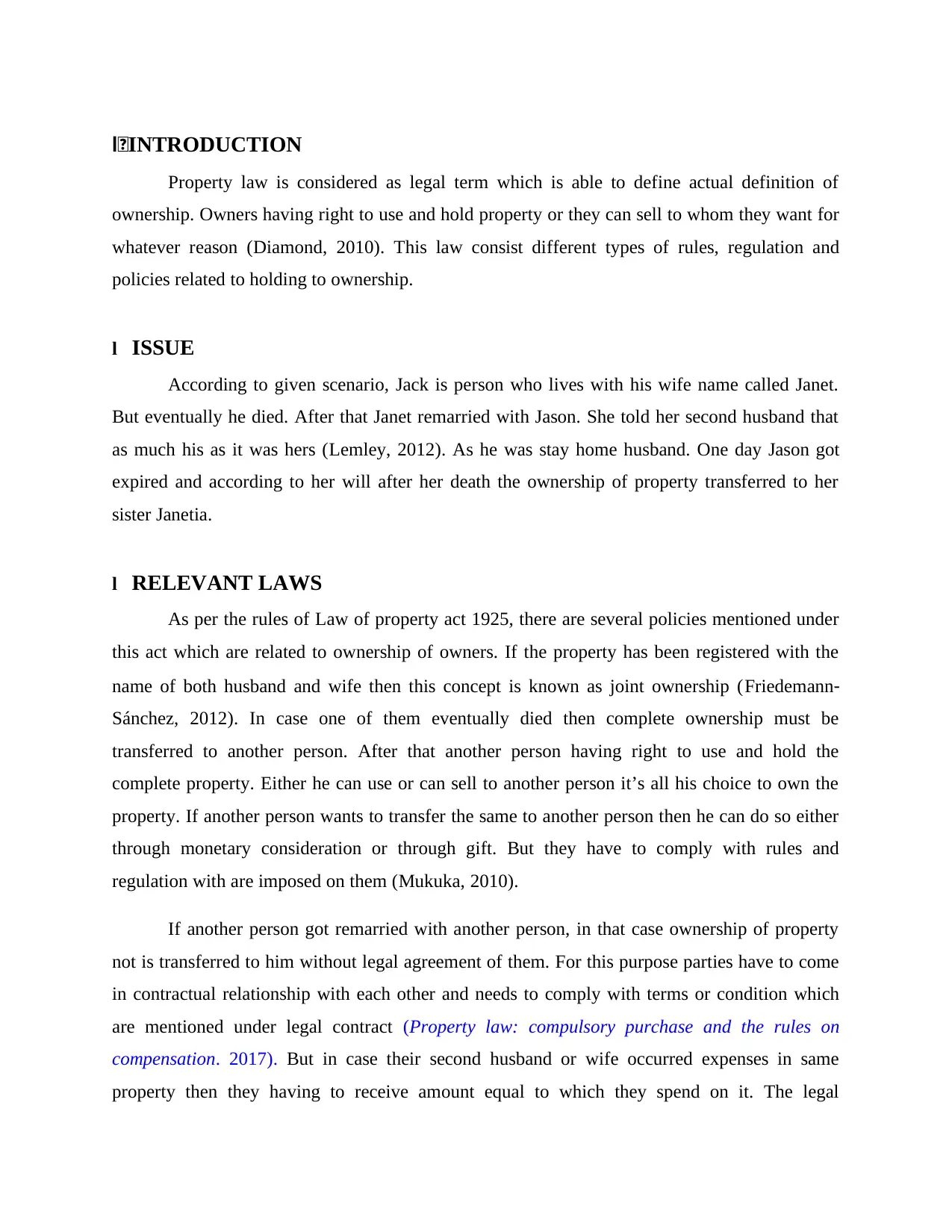
l壱INTRODUCTION
Property law is considered as legal term which is able to define actual definition of
ownership. Owners having right to use and hold property or they can sell to whom they want for
whatever reason (Diamond, 2010). This law consist different types of rules, regulation and
policies related to holding to ownership.
l壱ISSUE
According to given scenario, Jack is person who lives with his wife name called Janet.
But eventually he died. After that Janet remarried with Jason. She told her second husband that
as much his as it was hers (Lemley, 2012). As he was stay home husband. One day Jason got
expired and according to her will after her death the ownership of property transferred to her
sister Janetia.
l壱RELEVANT LAWS
As per the rules of Law of property act 1925, there are several policies mentioned under
this act which are related to ownership of owners. If the property has been registered with the
name of both husband and wife then this concept is known as joint ownership (Friedemann-
Sánchez, 2012). In case one of them eventually died then complete ownership must be
transferred to another person. After that another person having right to use and hold the
complete property. Either he can use or can sell to another person it’s all his choice to own the
property. If another person wants to transfer the same to another person then he can do so either
through monetary consideration or through gift. But they have to comply with rules and
regulation with are imposed on them (Mukuka, 2010).
If another person got remarried with another person, in that case ownership of property
not is transferred to him without legal agreement of them. For this purpose parties have to come
in contractual relationship with each other and needs to comply with terms or condition which
are mentioned under legal contract (Property law: compulsory purchase and the rules on
compensation. 2017). But in case their second husband or wife occurred expenses in same
property then they having to receive amount equal to which they spend on it. The legal
Property law is considered as legal term which is able to define actual definition of
ownership. Owners having right to use and hold property or they can sell to whom they want for
whatever reason (Diamond, 2010). This law consist different types of rules, regulation and
policies related to holding to ownership.
l壱ISSUE
According to given scenario, Jack is person who lives with his wife name called Janet.
But eventually he died. After that Janet remarried with Jason. She told her second husband that
as much his as it was hers (Lemley, 2012). As he was stay home husband. One day Jason got
expired and according to her will after her death the ownership of property transferred to her
sister Janetia.
l壱RELEVANT LAWS
As per the rules of Law of property act 1925, there are several policies mentioned under
this act which are related to ownership of owners. If the property has been registered with the
name of both husband and wife then this concept is known as joint ownership (Friedemann-
Sánchez, 2012). In case one of them eventually died then complete ownership must be
transferred to another person. After that another person having right to use and hold the
complete property. Either he can use or can sell to another person it’s all his choice to own the
property. If another person wants to transfer the same to another person then he can do so either
through monetary consideration or through gift. But they have to comply with rules and
regulation with are imposed on them (Mukuka, 2010).
If another person got remarried with another person, in that case ownership of property
not is transferred to him without legal agreement of them. For this purpose parties have to come
in contractual relationship with each other and needs to comply with terms or condition which
are mentioned under legal contract (Property law: compulsory purchase and the rules on
compensation. 2017). But in case their second husband or wife occurred expenses in same
property then they having to receive amount equal to which they spend on it. The legal
Paraphrase This Document
Need a fresh take? Get an instant paraphrase of this document with our AI Paraphraser
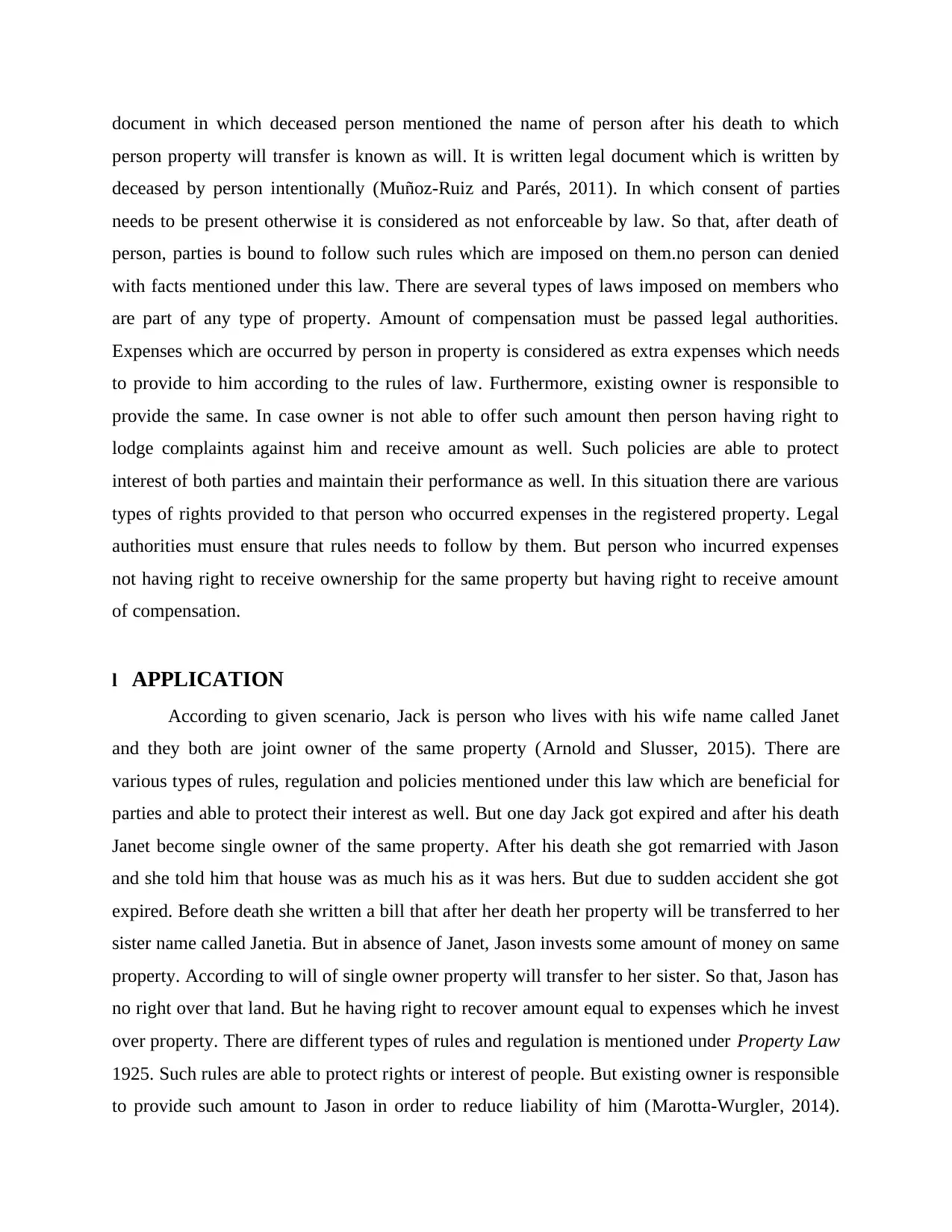
document in which deceased person mentioned the name of person after his death to which
person property will transfer is known as will. It is written legal document which is written by
deceased by person intentionally (Muñoz-Ruiz and Parés, 2011). In which consent of parties
needs to be present otherwise it is considered as not enforceable by law. So that, after death of
person, parties is bound to follow such rules which are imposed on them.no person can denied
with facts mentioned under this law. There are several types of laws imposed on members who
are part of any type of property. Amount of compensation must be passed legal authorities.
Expenses which are occurred by person in property is considered as extra expenses which needs
to provide to him according to the rules of law. Furthermore, existing owner is responsible to
provide the same. In case owner is not able to offer such amount then person having right to
lodge complaints against him and receive amount as well. Such policies are able to protect
interest of both parties and maintain their performance as well. In this situation there are various
types of rights provided to that person who occurred expenses in the registered property. Legal
authorities must ensure that rules needs to follow by them. But person who incurred expenses
not having right to receive ownership for the same property but having right to receive amount
of compensation.
l壱APPLICATION
According to given scenario, Jack is person who lives with his wife name called Janet
and they both are joint owner of the same property (Arnold and Slusser, 2015). There are
various types of rules, regulation and policies mentioned under this law which are beneficial for
parties and able to protect their interest as well. But one day Jack got expired and after his death
Janet become single owner of the same property. After his death she got remarried with Jason
and she told him that house was as much his as it was hers. But due to sudden accident she got
expired. Before death she written a bill that after her death her property will be transferred to her
sister name called Janetia. But in absence of Janet, Jason invests some amount of money on same
property. According to will of single owner property will transfer to her sister. So that, Jason has
no right over that land. But he having right to recover amount equal to expenses which he invest
over property. There are different types of rules and regulation is mentioned under Property Law
1925. Such rules are able to protect rights or interest of people. But existing owner is responsible
to provide such amount to Jason in order to reduce liability of him (Marotta-Wurgler, 2014).
person property will transfer is known as will. It is written legal document which is written by
deceased by person intentionally (Muñoz-Ruiz and Parés, 2011). In which consent of parties
needs to be present otherwise it is considered as not enforceable by law. So that, after death of
person, parties is bound to follow such rules which are imposed on them.no person can denied
with facts mentioned under this law. There are several types of laws imposed on members who
are part of any type of property. Amount of compensation must be passed legal authorities.
Expenses which are occurred by person in property is considered as extra expenses which needs
to provide to him according to the rules of law. Furthermore, existing owner is responsible to
provide the same. In case owner is not able to offer such amount then person having right to
lodge complaints against him and receive amount as well. Such policies are able to protect
interest of both parties and maintain their performance as well. In this situation there are various
types of rights provided to that person who occurred expenses in the registered property. Legal
authorities must ensure that rules needs to follow by them. But person who incurred expenses
not having right to receive ownership for the same property but having right to receive amount
of compensation.
l壱APPLICATION
According to given scenario, Jack is person who lives with his wife name called Janet
and they both are joint owner of the same property (Arnold and Slusser, 2015). There are
various types of rules, regulation and policies mentioned under this law which are beneficial for
parties and able to protect their interest as well. But one day Jack got expired and after his death
Janet become single owner of the same property. After his death she got remarried with Jason
and she told him that house was as much his as it was hers. But due to sudden accident she got
expired. Before death she written a bill that after her death her property will be transferred to her
sister name called Janetia. But in absence of Janet, Jason invests some amount of money on same
property. According to will of single owner property will transfer to her sister. So that, Jason has
no right over that land. But he having right to recover amount equal to expenses which he invest
over property. There are different types of rules and regulation is mentioned under Property Law
1925. Such rules are able to protect rights or interest of people. But existing owner is responsible
to provide such amount to Jason in order to reduce liability of him (Marotta-Wurgler, 2014).
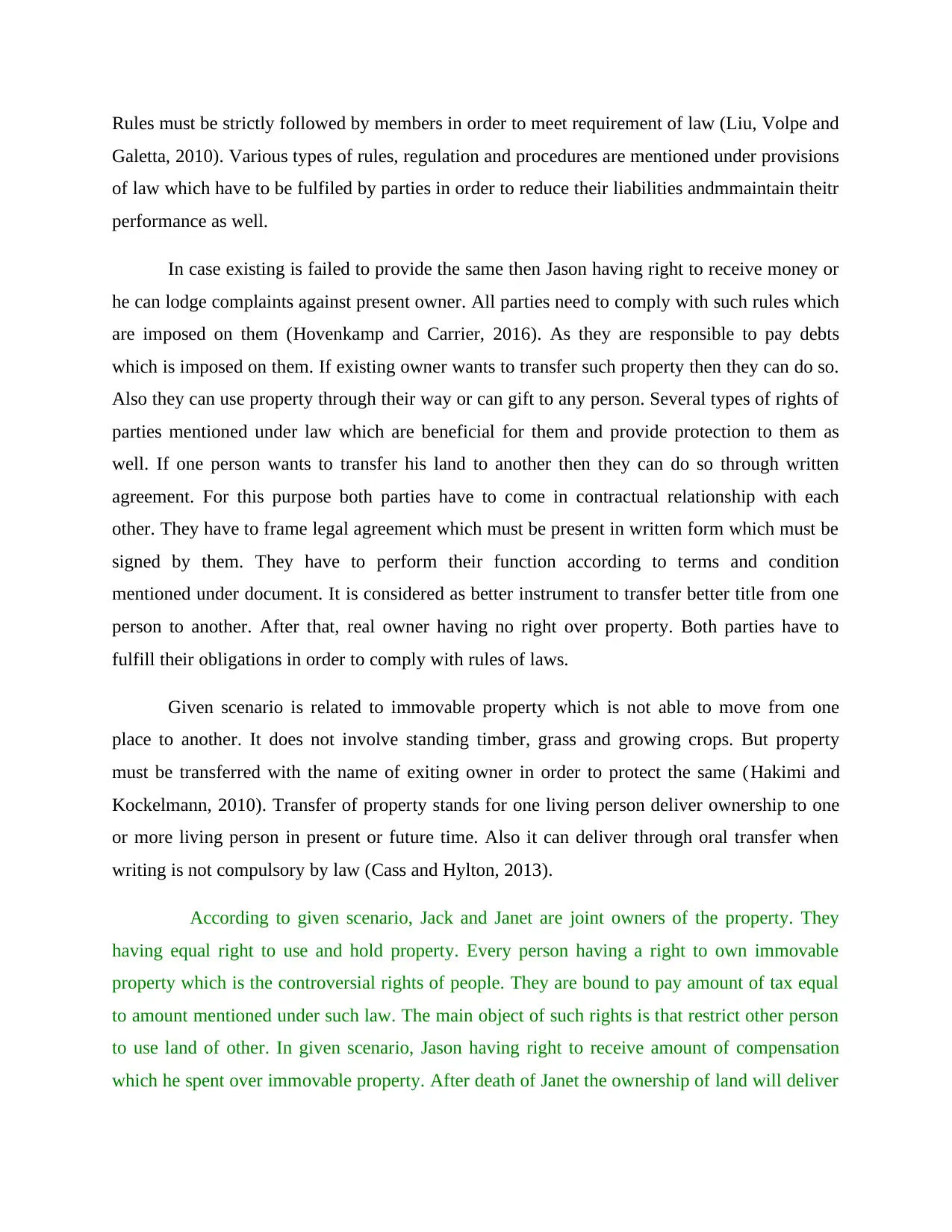
Rules must be strictly followed by members in order to meet requirement of law (Liu, Volpe and
Galetta, 2010). Various types of rules, regulation and procedures are mentioned under provisions
of law which have to be fulfiled by parties in order to reduce their liabilities andmmaintain theitr
performance as well.
In case existing is failed to provide the same then Jason having right to receive money or
he can lodge complaints against present owner. All parties need to comply with such rules which
are imposed on them (Hovenkamp and Carrier, 2016). As they are responsible to pay debts
which is imposed on them. If existing owner wants to transfer such property then they can do so.
Also they can use property through their way or can gift to any person. Several types of rights of
parties mentioned under law which are beneficial for them and provide protection to them as
well. If one person wants to transfer his land to another then they can do so through written
agreement. For this purpose both parties have to come in contractual relationship with each
other. They have to frame legal agreement which must be present in written form which must be
signed by them. They have to perform their function according to terms and condition
mentioned under document. It is considered as better instrument to transfer better title from one
person to another. After that, real owner having no right over property. Both parties have to
fulfill their obligations in order to comply with rules of laws.
Given scenario is related to immovable property which is not able to move from one
place to another. It does not involve standing timber, grass and growing crops. But property
must be transferred with the name of exiting owner in order to protect the same (Hakimi and
Kockelmann, 2010). Transfer of property stands for one living person deliver ownership to one
or more living person in present or future time. Also it can deliver through oral transfer when
writing is not compulsory by law (Cass and Hylton, 2013).
According to given scenario, Jack and Janet are joint owners of the property. They
having equal right to use and hold property. Every person having a right to own immovable
property which is the controversial rights of people. They are bound to pay amount of tax equal
to amount mentioned under such law. The main object of such rights is that restrict other person
to use land of other. In given scenario, Jason having right to receive amount of compensation
which he spent over immovable property. After death of Janet the ownership of land will deliver
Galetta, 2010). Various types of rules, regulation and procedures are mentioned under provisions
of law which have to be fulfiled by parties in order to reduce their liabilities andmmaintain theitr
performance as well.
In case existing is failed to provide the same then Jason having right to receive money or
he can lodge complaints against present owner. All parties need to comply with such rules which
are imposed on them (Hovenkamp and Carrier, 2016). As they are responsible to pay debts
which is imposed on them. If existing owner wants to transfer such property then they can do so.
Also they can use property through their way or can gift to any person. Several types of rights of
parties mentioned under law which are beneficial for them and provide protection to them as
well. If one person wants to transfer his land to another then they can do so through written
agreement. For this purpose both parties have to come in contractual relationship with each
other. They have to frame legal agreement which must be present in written form which must be
signed by them. They have to perform their function according to terms and condition
mentioned under document. It is considered as better instrument to transfer better title from one
person to another. After that, real owner having no right over property. Both parties have to
fulfill their obligations in order to comply with rules of laws.
Given scenario is related to immovable property which is not able to move from one
place to another. It does not involve standing timber, grass and growing crops. But property
must be transferred with the name of exiting owner in order to protect the same (Hakimi and
Kockelmann, 2010). Transfer of property stands for one living person deliver ownership to one
or more living person in present or future time. Also it can deliver through oral transfer when
writing is not compulsory by law (Cass and Hylton, 2013).
According to given scenario, Jack and Janet are joint owners of the property. They
having equal right to use and hold property. Every person having a right to own immovable
property which is the controversial rights of people. They are bound to pay amount of tax equal
to amount mentioned under such law. The main object of such rights is that restrict other person
to use land of other. In given scenario, Jason having right to receive amount of compensation
which he spent over immovable property. After death of Janet the ownership of land will deliver
⊘ This is a preview!⊘
Do you want full access?
Subscribe today to unlock all pages.

Trusted by 1+ million students worldwide
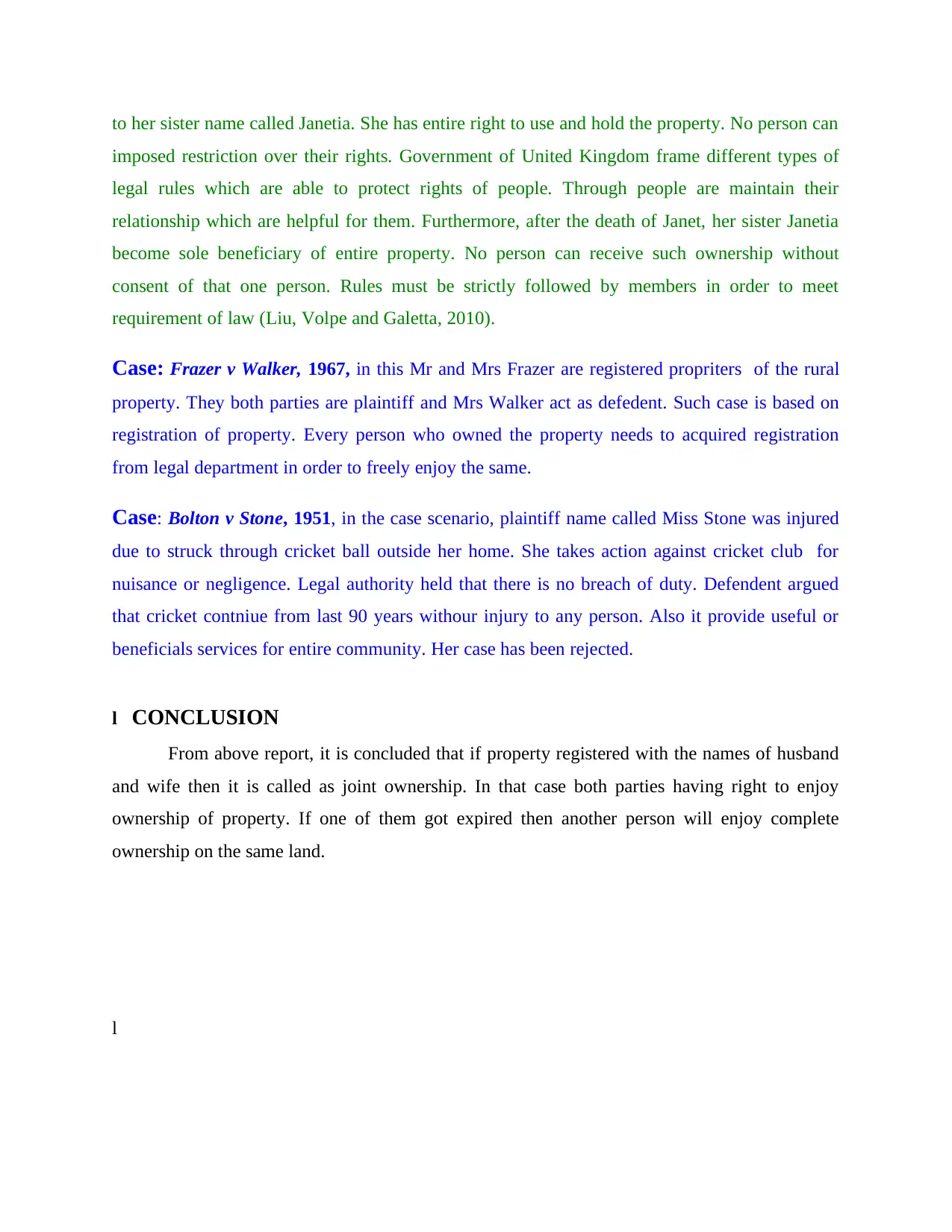
to her sister name called Janetia. She has entire right to use and hold the property. No person can
imposed restriction over their rights. Government of United Kingdom frame different types of
legal rules which are able to protect rights of people. Through people are maintain their
relationship which are helpful for them. Furthermore, after the death of Janet, her sister Janetia
become sole beneficiary of entire property. No person can receive such ownership without
consent of that one person. Rules must be strictly followed by members in order to meet
requirement of law (Liu, Volpe and Galetta, 2010).
Case: Frazer v Walker, 1967, in this Mr and Mrs Frazer are registered propriters of the rural
property. They both parties are plaintiff and Mrs Walker act as defedent. Such case is based on
registration of property. Every person who owned the property needs to acquired registration
from legal department in order to freely enjoy the same.
Case: Bolton v Stone, 1951, in the case scenario, plaintiff name called Miss Stone was injured
due to struck through cricket ball outside her home. She takes action against cricket club for
nuisance or negligence. Legal authority held that there is no breach of duty. Defendent argued
that cricket contniue from last 90 years withour injury to any person. Also it provide useful or
beneficials services for entire community. Her case has been rejected.
l壱CONCLUSION
From above report, it is concluded that if property registered with the names of husband
and wife then it is called as joint ownership. In that case both parties having right to enjoy
ownership of property. If one of them got expired then another person will enjoy complete
ownership on the same land.
l壱
imposed restriction over their rights. Government of United Kingdom frame different types of
legal rules which are able to protect rights of people. Through people are maintain their
relationship which are helpful for them. Furthermore, after the death of Janet, her sister Janetia
become sole beneficiary of entire property. No person can receive such ownership without
consent of that one person. Rules must be strictly followed by members in order to meet
requirement of law (Liu, Volpe and Galetta, 2010).
Case: Frazer v Walker, 1967, in this Mr and Mrs Frazer are registered propriters of the rural
property. They both parties are plaintiff and Mrs Walker act as defedent. Such case is based on
registration of property. Every person who owned the property needs to acquired registration
from legal department in order to freely enjoy the same.
Case: Bolton v Stone, 1951, in the case scenario, plaintiff name called Miss Stone was injured
due to struck through cricket ball outside her home. She takes action against cricket club for
nuisance or negligence. Legal authority held that there is no breach of duty. Defendent argued
that cricket contniue from last 90 years withour injury to any person. Also it provide useful or
beneficials services for entire community. Her case has been rejected.
l壱CONCLUSION
From above report, it is concluded that if property registered with the names of husband
and wife then it is called as joint ownership. In that case both parties having right to enjoy
ownership of property. If one of them got expired then another person will enjoy complete
ownership on the same land.
l壱
Paraphrase This Document
Need a fresh take? Get an instant paraphrase of this document with our AI Paraphraser
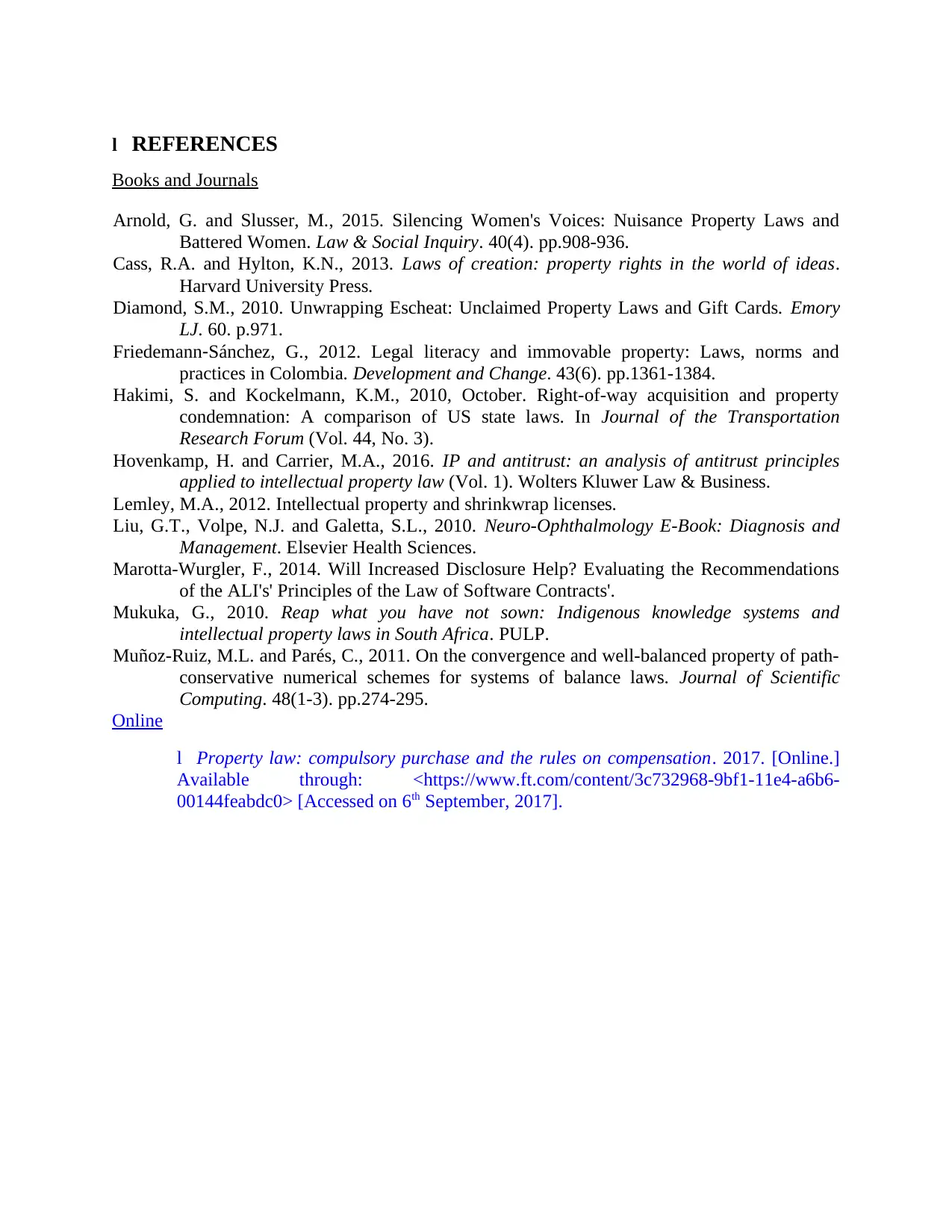
l壱REFERENCES
Books and Journals
Arnold, G. and Slusser, M., 2015. Silencing Women's Voices: Nuisance Property Laws and
Battered Women. Law & Social Inquiry. 40(4). pp.908-936.
Cass, R.A. and Hylton, K.N., 2013. Laws of creation: property rights in the world of ideas.
Harvard University Press.
Diamond, S.M., 2010. Unwrapping Escheat: Unclaimed Property Laws and Gift Cards. Emory
LJ. 60. p.971.
Friedemann-Sánchez, G., 2012. Legal literacy and immovable property: Laws, norms and
practices in Colombia. Development and Change. 43(6). pp.1361-1384.
Hakimi, S. and Kockelmann, K.M., 2010, October. Right-of-way acquisition and property
condemnation: A comparison of US state laws. In Journal of the Transportation
Research Forum (Vol. 44, No. 3).
Hovenkamp, H. and Carrier, M.A., 2016. IP and antitrust: an analysis of antitrust principles
applied to intellectual property law (Vol. 1). Wolters Kluwer Law & Business.
Lemley, M.A., 2012. Intellectual property and shrinkwrap licenses.
Liu, G.T., Volpe, N.J. and Galetta, S.L., 2010. Neuro-Ophthalmology E-Book: Diagnosis and
Management. Elsevier Health Sciences.
Marotta-Wurgler, F., 2014. Will Increased Disclosure Help? Evaluating the Recommendations
of the ALI's' Principles of the Law of Software Contracts'.
Mukuka, G., 2010. Reap what you have not sown: Indigenous knowledge systems and
intellectual property laws in South Africa. PULP.
Muñoz-Ruiz, M.L. and Parés, C., 2011. On the convergence and well-balanced property of path-
conservative numerical schemes for systems of balance laws. Journal of Scientific
Computing. 48(1-3). pp.274-295.
Online
l壱Property law: compulsory purchase and the rules on compensation. 2017. [Online.]
Available through: <https://www.ft.com/content/3c732968-9bf1-11e4-a6b6-
00144feabdc0> [Accessed on 6th September, 2017].
Books and Journals
Arnold, G. and Slusser, M., 2015. Silencing Women's Voices: Nuisance Property Laws and
Battered Women. Law & Social Inquiry. 40(4). pp.908-936.
Cass, R.A. and Hylton, K.N., 2013. Laws of creation: property rights in the world of ideas.
Harvard University Press.
Diamond, S.M., 2010. Unwrapping Escheat: Unclaimed Property Laws and Gift Cards. Emory
LJ. 60. p.971.
Friedemann-Sánchez, G., 2012. Legal literacy and immovable property: Laws, norms and
practices in Colombia. Development and Change. 43(6). pp.1361-1384.
Hakimi, S. and Kockelmann, K.M., 2010, October. Right-of-way acquisition and property
condemnation: A comparison of US state laws. In Journal of the Transportation
Research Forum (Vol. 44, No. 3).
Hovenkamp, H. and Carrier, M.A., 2016. IP and antitrust: an analysis of antitrust principles
applied to intellectual property law (Vol. 1). Wolters Kluwer Law & Business.
Lemley, M.A., 2012. Intellectual property and shrinkwrap licenses.
Liu, G.T., Volpe, N.J. and Galetta, S.L., 2010. Neuro-Ophthalmology E-Book: Diagnosis and
Management. Elsevier Health Sciences.
Marotta-Wurgler, F., 2014. Will Increased Disclosure Help? Evaluating the Recommendations
of the ALI's' Principles of the Law of Software Contracts'.
Mukuka, G., 2010. Reap what you have not sown: Indigenous knowledge systems and
intellectual property laws in South Africa. PULP.
Muñoz-Ruiz, M.L. and Parés, C., 2011. On the convergence and well-balanced property of path-
conservative numerical schemes for systems of balance laws. Journal of Scientific
Computing. 48(1-3). pp.274-295.
Online
l壱Property law: compulsory purchase and the rules on compensation. 2017. [Online.]
Available through: <https://www.ft.com/content/3c732968-9bf1-11e4-a6b6-
00144feabdc0> [Accessed on 6th September, 2017].
1 out of 8
Related Documents
Your All-in-One AI-Powered Toolkit for Academic Success.
+13062052269
info@desklib.com
Available 24*7 on WhatsApp / Email
![[object Object]](/_next/static/media/star-bottom.7253800d.svg)
Unlock your academic potential
Copyright © 2020–2026 A2Z Services. All Rights Reserved. Developed and managed by ZUCOL.





